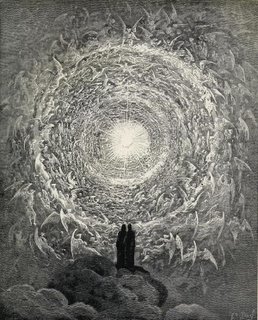
In 1921, for the 600th anniversary of Dante's death, Pope Benedict XV in In Praeclara Summorum proclaimed:
"Among the many celebrated geniuses of whom the Catholic faith can boast who have left undying fruits in literature and art especially, besides other fields of learning, and to whom civilization and religion are ever in debt, highest stands the name of Dante Alighieri, the sixth centenary of whose death will soon be recorded.
"So that while we admire the greatness and keenness of his genius, we have to recognize, too, the measure in which he drew inspiration from the Divine Faith by means of which he could beautify his immortal poems with all the lights of revealed truths as well as with the splendours of art. Indeed, his Commedia, which deservedly earned the title of Divina, while it uses various symbolic images and records the lives of mortals on earth, has for its true aim the glorification of the justice and providence of God who rules the world through time and all eternity and punishes and rewards the actions of individuals and human society. It is thus that, according to the Divine Revelation, in this poem shines out the majesty of God One and Three, the Redemption of the human race operated by the Word of God made Man, the supreme loving-kindness and charity of Mary, Virgin and Mother, Queen of Heaven, and lastly the glory on high of Angels, Saints and men; then the terrible contrast to this, the pains of the impious in Hell; then the middle world, so to speak, between Heaven and Hell, Purgatory, the Ladder of souls destined after expiation to supreme beatitude. It is indeed marvellous how he was able to weave into all three poems these three dogmas with truly wrought design.
"Therefore the divine poet depicted the triple life of souls as he imagined it in a such way as to illuminate with the light of the true doctrine of the faith the condemnation of the impious, the purgation of the good spirits and the eternal happiness of the blessed before the final judgment.
"There breathes in Alighieri the piety that we too feel; the Faith has the same meaning for us; it is covered with the same veil, "the truth given to us from on high, by which we are lifted so high." That is his great glory, to be the Christian poet, to have sung with Divine accents those Christian ideals which he so passionately loved in all the splendour of their beauty, feeling them intimately and making them his life.
"And you, beloved children, whose lot it is to promote learning under the magisterium of the Church, continue as you are doing to love and tend the noble poet whom We do not hesitate to call the most eloquent singer of the Christian idea. The more profit you draw from study of him the higher will be your culture, irradiated by the splendours of truth, and the stronger and more spontaneous your devotion to the Catholic Faith."
No comments:
Post a Comment